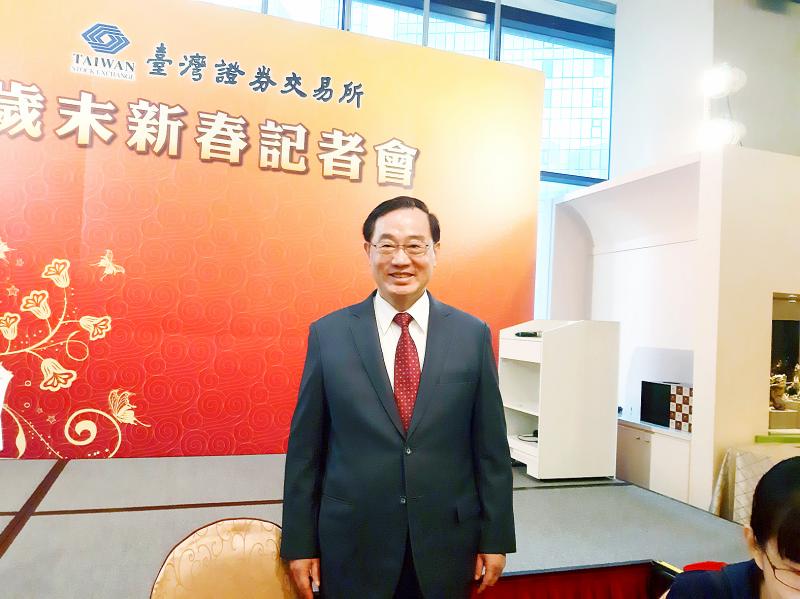The Taiwan Stock Exchange (TWSE), the Taipei Exchange (TPEX), the Taiwan Futures Exchange (TAIFEX) and Taiwan Depository and Clearing Corp (TDCC) could move into one building in downtown Taipei in six years, TWSE chairman Hsu Jan-yau (許璋瑤) said yesterday.
The four companies have invested in an urban renewal project run by Chunghwa Post Co (中華郵政) that would transform the historic Taipei Beimen Post Office site into a national postal museum and two high-rises, Hsu told a news conference in Taipei.
The four are mulling whether to move into one of the high-rises, which could make their coordination efforts more efficient, once construction is completed in six years’ time, he said.

Photo: CNA
TWSE rents office space in Taipei 101, while the other three are headquartered either in Taipei’s Songshan (松山) or Zhongzheng (中正) districts.
The Financial Supervisory Commission, now in New Taipei’s City’s Banciao District (板橋), would probably also relocate to the same building, but it is still in talks with the National Property Administration (NPA), the landowner of the renewal project, he said.
The commission’s plan to have all of its units relocate to the new building has not been finalized, Securities and Futures Bureau Chief Secretary Kao Ching-ping (高晶萍) told the Taipei Times.
Whether the TWSE’s Banciao-based information center, which addresses all online transactions of stocks listed in TWSE and accommodates the TPEX’s and TAIFEX’s computers systems, would also be moved is also uncertain, Kao said.
In related news, the TWSE has set a goal of 24 initial public offering applications this year amid expectations that the economy would improve as the COVID-19 pandemic slows down, Hsu said.
While the TWSE is planning to establish the Taiwan Innovation Board (TIB) for start-ups focused on Internet of Things or artificial intelligence, and biotech firms by July at the earliest, it hopes to see at least five applications, TWSE president Chien Lih-chung (簡立忠) said.
Given that some firms have already approached the exchange to ask about the TIB, it seems that start-ups are interested in the new boards, Chien said.
Meanwhile, Hsu said that odd-lot trading has pushed up the number of shareholders of several high-priced stocks, such as Taiwan Semiconductor Manufacturing Co (台積電) and Largan Precision Co (大立光), since such transactions — referring to orders of fewer than 1,000 — began on Oct. 26 last year.
Thanks to odd-lot trading, the number of brokerage accounts nationwide rose to 616,000 at the end of last year from 218,000 prior to Oct. 26, with the number of investors aged between 21 and 30 more than tripling during that period, TWSE data showed.

Stephen Garrett, a 27-year-old graduate student, always thought he would study in China, but first the country’s restrictive COVID-19 policies made it nearly impossible and now he has other concerns. The cost is one deterrent, but Garrett is more worried about restrictions on academic freedom and the personal risk of being stranded in China. He is not alone. Only about 700 American students are studying at Chinese universities, down from a peak of nearly 25,000 a decade ago, while there are nearly 300,000 Chinese students at US schools. Some young Americans are discouraged from investing their time in China by what they see

MAJOR DROP: CEO Tim Cook, who is visiting Hanoi, pledged the firm was committed to Vietnam after its smartphone shipments declined 9.6% annually in the first quarter Apple Inc yesterday said it would increase spending on suppliers in Vietnam, a key production hub, as CEO Tim Cook arrived in the country for a two-day visit. The iPhone maker announced the news in a statement on its Web site, but gave no details of how much it would spend or where the money would go. Cook is expected to meet programmers, content creators and students during his visit, online newspaper VnExpress reported. The visit comes as US President Joe Biden’s administration seeks to ramp up Vietnam’s role in the global tech supply chain to reduce the US’ dependence on China. Images on

Taiwan Transport and Storage Corp (TTS, 台灣通運倉儲) yesterday unveiled its first electric tractor unit — manufactured by Volvo Trucks — in a ceremony in Taipei, and said the unit would soon be used to transport cement produced by Taiwan Cement Corp (TCC, 台灣水泥). Both TTS and TCC belong to TCC International Holdings Ltd (台泥國際集團). With the electric tractor unit, the Taipei-based cement firm would become the first in Taiwan to use electric vehicles to transport construction materials. TTS chairman Koo Kung-yi (辜公怡), Volvo Trucks vice president of sales and marketing Johan Selven, TCC president Roman Cheng (程耀輝) and Taikoo Motors Group

New apartments in Taiwan’s major cities are getting smaller, while old apartments are increasingly occupied by older people, many of whom live alone, government data showed. The phenomenon has to do with sharpening unaffordable property prices and an aging population, property brokers said. Apartments with one bedroom that are two years old or older have gained a noticeable presence in the nation’s six special municipalities as well as Hsinchu county and city in the past five years, Evertrust Rehouse Co (永慶房產集團) found, citing data from the government’s real-price transaction platform. In Taipei, apartments with one bedroom accounted for 19 percent of deals last